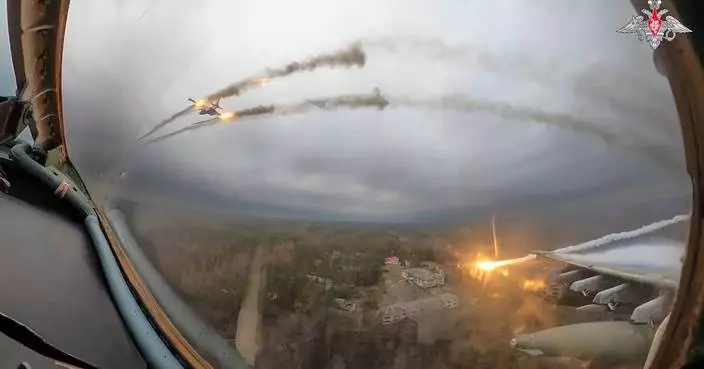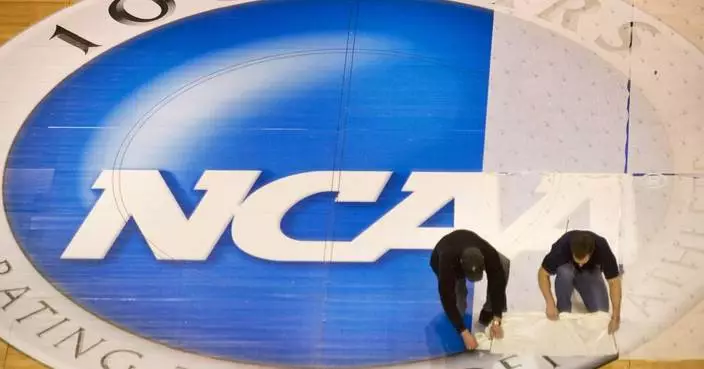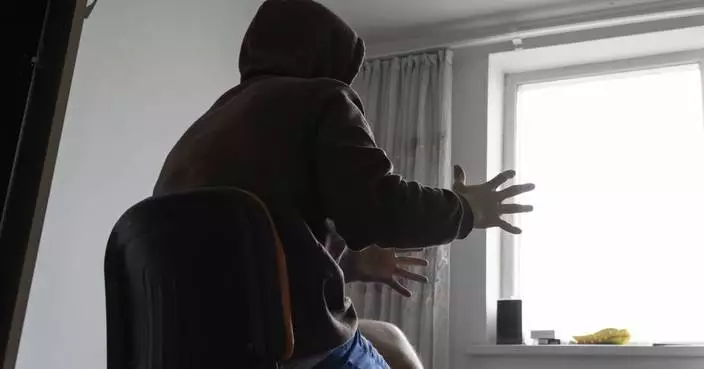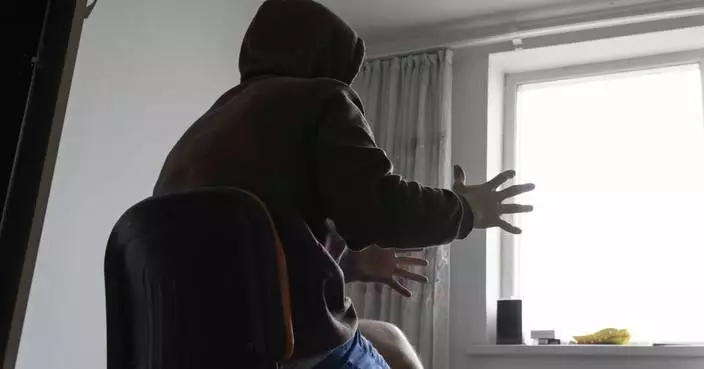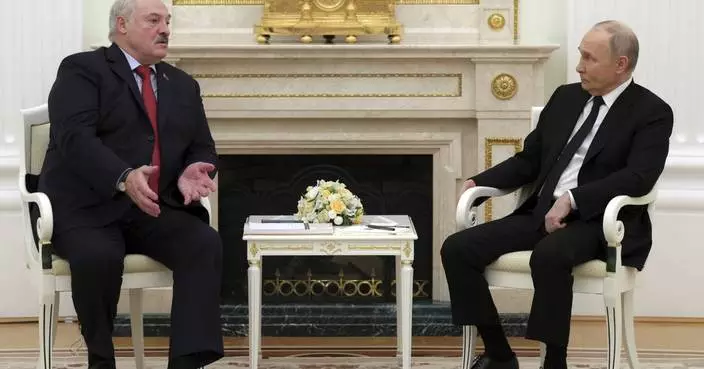The White House and the State Department are at odds over Russian President Vladimir Putin's offer to allow the U.S. access to Russians accused of election meddling in return for interviews of Americans accused by the Kremlin of unspecified crimes.
Even as the White House said the offer, made by Putin to President Donald Trump at their summit in Helsinki on Monday, was under consideration, the State Department called Russia's allegations against the Americans "absurd," suggesting that any questioning of them would not be countenanced by the U.S. The Russian claims against the Americans, including former U.S. Ambassador to Russia Michael McFaul, relate to allegations of fraud and corruption.

President Donald Trump waves to members of the media as he walks towards the West Wing of the White House in Washington, Wednesday, July 18, 2018, after returning from Andrews Air Force Base, and paying respects to the family of fallen U.S. Secret Service special agent Nole Edward Remagen who suffered a stroke while on duty in Scotland. (AP Photo/Andrew Harnik)
"The overall assertions that have come out of the Russian government are absolutely absurd: the fact that they want to question 11 American citizens and the assertions that the Russian government is making about those American citizens," spokeswoman Heather Nauert told reporters.
McFaul tweeted Wednesday: "I hope the White House corrects the record and denounces in categorical terms this ridiculous request from Putin. Not doing so creates moral equivalency between a legitimacy US indictment of Russian intelligence officers and a crazy, completely fabricated story invented by Putin."
Nauert noted that a U.S. federal court had already rejected Russia's charges regarding British businessman and vocal Kremlin critic Bill Browder. She said Russian authorities already know the U.S. position. Browder was a driving force behind a U.S. law targeting Russian officials over human rights abuses.
"We do not stand by those assertions that the Russian government makes," Nauert said. "The Prosecutor General in Russia is well aware that the United States has rejected Russian allegations in this regard. ... We continue to urge Russian authorities to work with the U.S. Department of Justice to pursue those in Russia who in fact perpetrated the fraudulent scheme that Russia refers to that targeted not only Mr. Browder, but also his company and ... the Russian people as a whole."
FBI Director Christopher Wray was similarly dismissive. Speaking Wednesday at the Aspen Security Forum in Colorado, he said Putin's offer was "not high on our list of investigative techniques."
Wray and Nauert's comments stood in sharp contrast to those of White House press secretary Sarah Huckabee Sanders, who held open the possibility that what Trump called "an incredible offer" is being weighed.
"The president's going to meet with his team, and we'll let you know when we have an announcement on that," she said, adding that neither Trump nor anyone else in the administration had committed to accepting the offer.
HELENA, Mont. (AP) — BNSF Railway attorneys told a Montana jury Friday that the railroad should not be held liable for the lung cancer deaths of two former residents of an asbestos-contaminated Montana town, one of the deadliest sites in the federal Superfund pollution program.
Attorneys for the company say the corporate predecessors of the railroad, owned by Warren Buffett’s Berkshire Hathaway conglomerate, didn't know the vermiculite they hauled over decades from a nearby mine was filled with hazardous microscopic asbestos fibers or that asbestos was dangerous.
BNSF attorney Chad Knight said the railroad could only be held liable if it could have foreseen the health hazards of asbestos based on information available decades ago when the alleged exposures happened.
“In the 50s, 60s and 70s no one in the public suspected there might be health concerns,” Knight said.
The case in federal civil court is the first of numerous lawsuits against the Texas-based railroad corporation to reach trial over its past operations in Libby, Montana. Current and former residents of the small town near the U.S.-Canada border want BNSF held accountable for its alleged role in asbestos exposure that health officials say has killed several hundred people and sickened thousands.
The seven-member jury met briefly Friday and planned to resume deliberations on Monday morning. They were instructed to decide if the railroad was at fault in the deaths and if so, the amount of damages to award to their estates. If the jurors find that the railroad should also face punitive damages, a separate hearing would determine that amount.
Looming over the proceedings is W.R. Grace & Co., a chemical company that operated a mountaintop vermiculite mine 7 miles (11 kilometers) outside of Libby until it was closed 1990. The Maryland-based company played a central role in Libby's tragedy and has paid significant settlements to victims.
U.S. District Court Judge Brian Morris has referred to the the chemical company as “the elephant in the room” in the BNSF trial. He reminded jurors several times that the case was about the railroad's conduct, not W.R. Grace's separate liability.
How much W.R. Grace revealed about the asbestos dangers to Texas-based BNSF and its corporate predecessors has been sharply disputed. The plaintiffs argued that railroad higher-ups were aware, but that workers on the ground in Libby were left out of the loop.
“We're here to make a party that accepts zero responsibility accept an appropriate amount of responsibility,” plaintiffs' attorney Mark Lanier said. “This is the fault of the bigwigs in the corporate office.”
The judge instructed the jury it could only find the railroad negligent based on its actions in the Libby Railyard, not for hauling the vermiculite.
The railroad said it was obliged under law to ship the vermiculite, which was used in insulation and for other commercial purposes. It said W.R. Grace employees had concealed the health hazards from the railroad.
Former railroad workers said during testimony and in depositions that they knew nothing about the risks of asbestos. They said Grace employees were responsible for loading the hopper cars, plugging the holes of any cars leaking vermiculite and occasionally cleaned up material that spilled in the rail yard.
The estates of the two deceased plaintiffs have argued that the W.R. Grace’s actions don’t absolve BNSF of its responsibility for failing to clean up the vermiculite that spilled in the railyard in the heart of the community.
Their attorneys said BNSF should have known about the dangers because Grace put signs on rail cars carrying vermiculite warning of potential health risks. They showed jurors an image of a warning label allegedly attached to rail cars in the late 1970s that advised against inhaling the asbestos dust because it could cause bodily harm.
Family members of Tom Wells and Joyce Walder testified that their lives ended soon after they were diagnosed with mesothelioma. The families said the dust blowing from the rail yard sickened and killed them.
In a March 2020 video of Wells played for jurors and recorded the day before he died, he lay in a home hospital bed, struggling to breathe.
“I’ve been placed in a horrible spot here, and the best chance I see at release — relief for everybody — is to just get it over with,” he said. “It’s just not something I want to try and play hero through because I don’t think that there’s a miracle waiting.”
The Environmental Protection Agency descended on Libby after the 1999 news reports. In 2009 it declared in Libby the nation’s first ever public health emergency under the federal Superfund cleanup program.
The pollution in Libby has been cleaned up, largely at public expense. Yet the long timeframe over which asbestos-related diseases develop means people previously exposed are likely to continue getting sick for years to come, health officials say.
Brown reported from Billings, Montana.
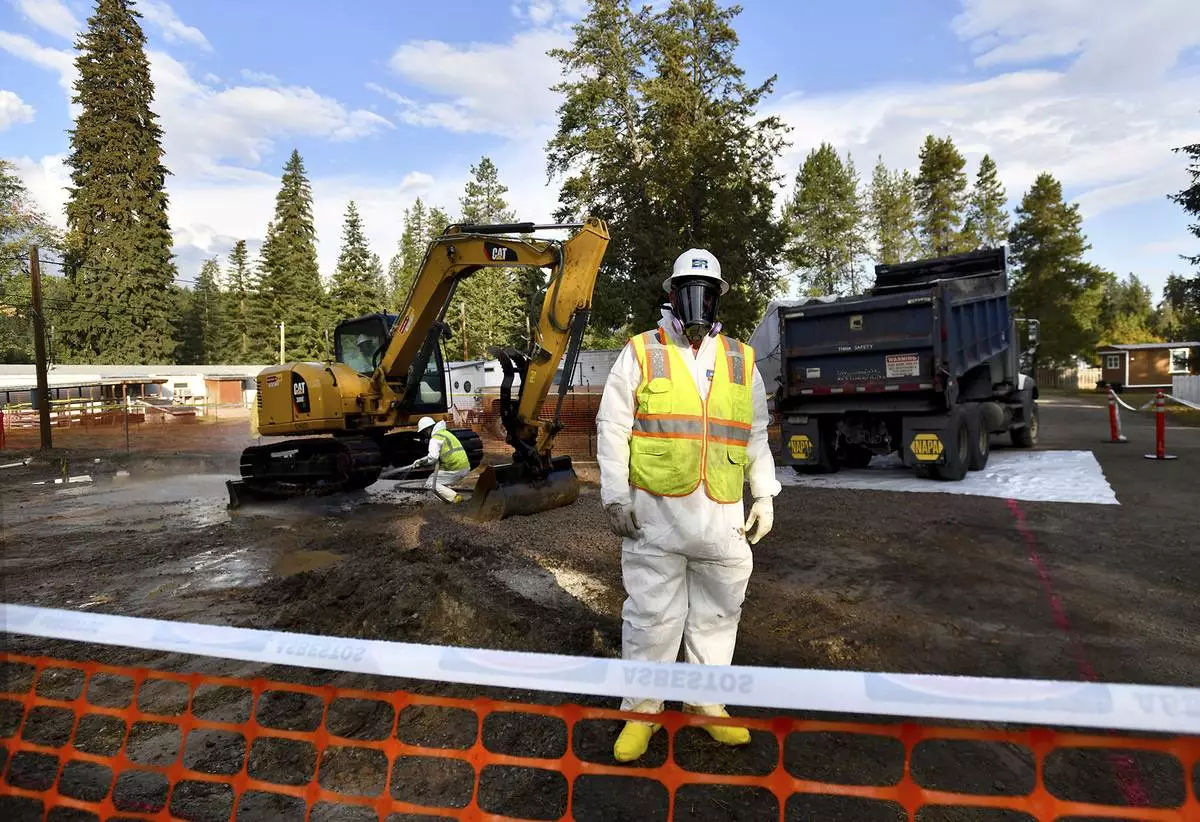
FILE - Environmental cleanup specialists work at one of the last remaining residential asbestos cleanup sites in Libby, Montana, in mid-September. BNSF Railway attorneys are expected to argue before jurors Friday, April 19, 2024, that the railroad should not be held liable for the lung cancer deaths of two former residents of the asbestos-contaminated Montana town, one of the deadliest sites in the federal Superfund pollution program. (Kurt Wilson/The Missoulian via AP, File)
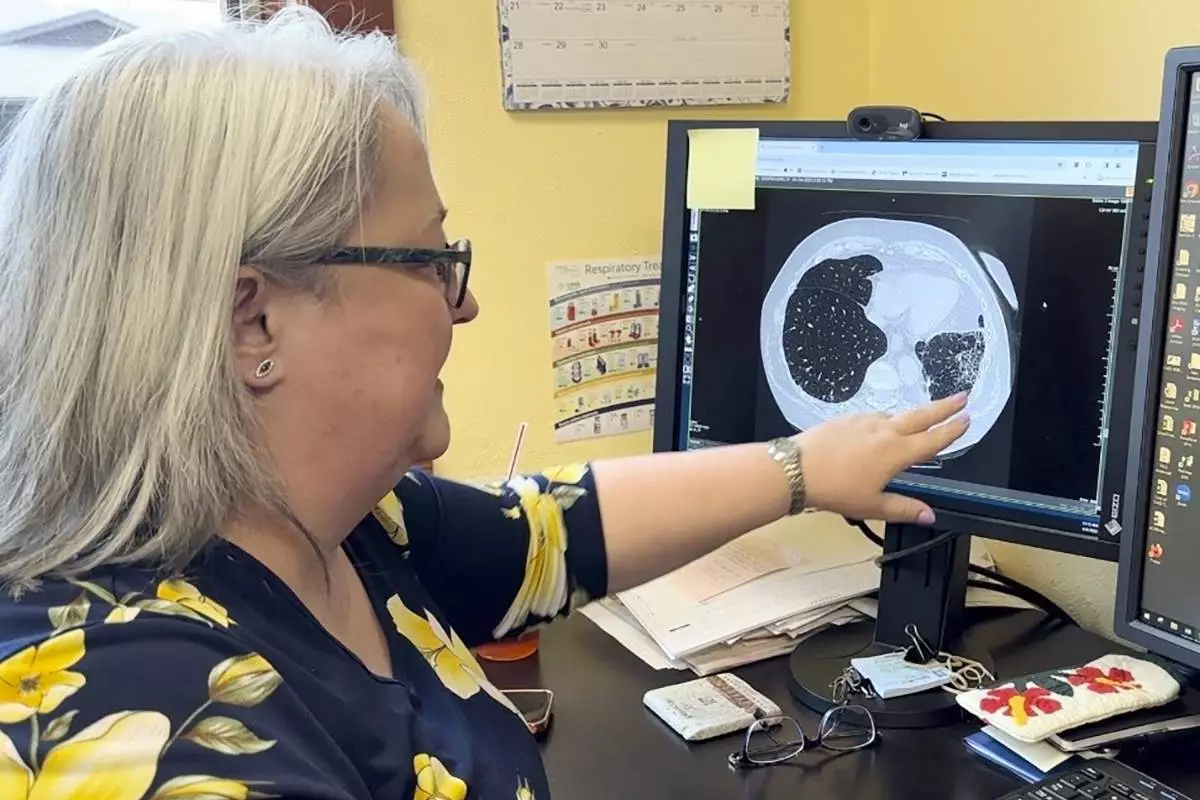
FILE - Dr. Lee Morissette shows an image of lungs damaged by asbestos exposure, at the Center for Asbestos Related Disease, Thursday, April 4, 2024, in Libby, Mont. BNSF Railway attorneys are expected to argue before jurors Friday, April 19, 2024, that the railroad should not be held liable for the lung cancer deaths of two former residents of the asbestos-contaminated Montana town, one of the deadliest sites in the federal Superfund pollution program. (AP Photo/Matthew Brown, File)
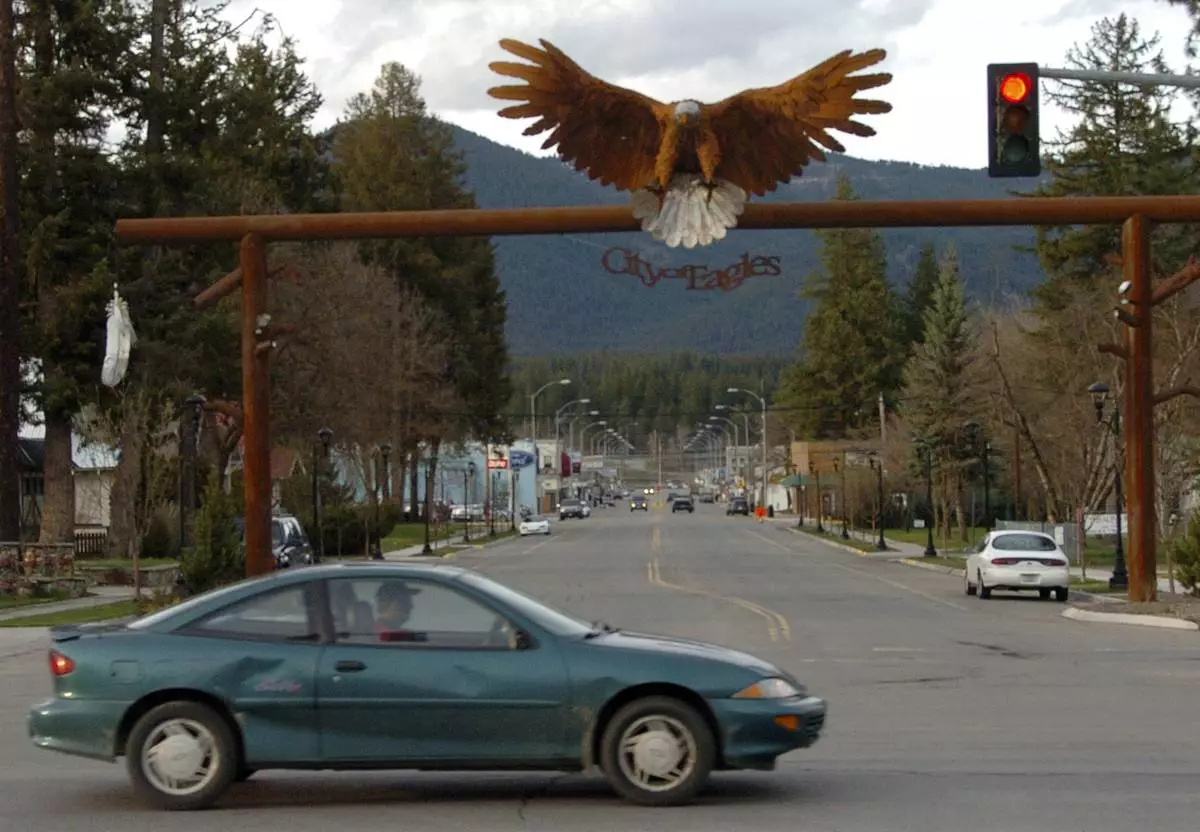
FILE - In this April 27, 2011, file photo, the entrance to downtown Libby, Mont., is seen. BNSF Railway attorneys are expected to argue before jurors Friday, April 19, 2024, that the railroad should not be held liable for the lung cancer deaths of two former residents of the asbestos-contaminated Montana town, one of the deadliest sites in the federal Superfund pollution program. (AP Photo/Matthew Brown, File)







